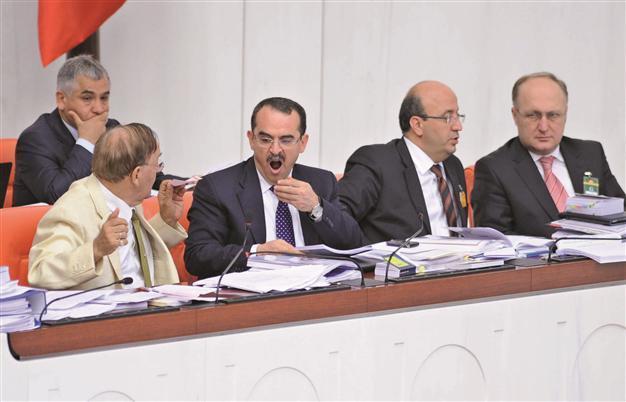Gov’t rules out prospect of two-headed judiciary
ANKARA - Hürriyet Daily News

The Justice Minister Sadullah Ergin (C) says Turkey has made a a transition to more expert courts by abolishing specially authorized courts for serious crimes. Daily News Photo by Selahattin Sönmez
Turkey’s opposition parties expressed a deepening and increasing concern on July 3 over the possible implications of a recent a reform abolishing the specially authorized courts, saying that it would lead to a two-headed structure in the management of the judicial system.
The government, however, has quashed such criticism with a counterargument, saying that the reform is actually aimed at the privileged authorities of the specially authorized courts, and provides more equal circumstances and tools for defendants.
“At the moment Turkey has made a transition to more expert courts by abolishing specially authorized courts for serious crimes and founding the new courts for serious crimes,” Deputy Prime Minister Bekir Bozdağ told public television channel TRT Haber on July 3.
The specially authorized courts have always been controversial since their establishment in 2005. The opposition parties have strongly criticized the government over these courts, accusing it of using them as tools for its revanchist moves.
But now, criticism of the move has raised doubts about its impact on ongoing trials, and whether hundreds of suspects arrested as part of a large coup investigation, Ergenekon, would be freed. The government’s claim that the ongoing trials in the specially authorized courts, such as the Ergenekon and Balyoz coup probes and the Kurdistan Communities Union (KCK) case, would not be negatively affected by the changes has led to debate over the prospect for the creation of a two-headed judicial structure.
“What is being done is not forming a two-headed trial process. It is founding new expertise-heavy criminal courts and abolishing privileges within the judiciary,” Bozdağ said.
The main opposition Republican People’s Party (CHP) is considering taking the reform to the Constitutional Court, suggesting that it violates the principle of equality. Still, Deputy Prime Minister Bülent Arınç has suggested the new arrangements are more in line with democratic norms when compared to the past.
“I believe that the new arrangement will be more humanitarian and legal. There will not be any lengthy pre-trial detentions, because judges will have to make justifications when ruling on arrests and releases,” Arınç told reporters late on Monday during a town-hall meeting of his ruling Justice and Development Party (
AKP) in Istanbul.
Bozdağ, meanwhile, used a July 2 ruling convicting Turkey’s favorite sport of attempted rigging in the landmark football corruption case, while allowing the key figures in the case – including Fenerbahçe Chairman Aziz Yıldırım – to walk free, as a proof of his point.
“This is confirms what we are saying. The process regarding the Supreme Court of Appeals is unclear, but there should be a verdict for release,” Bozdağ said, adding that Monday’s release verdict could have come earlier if the court had used its judicial discretion this way.
